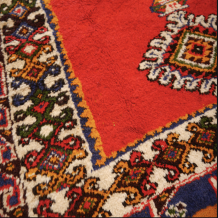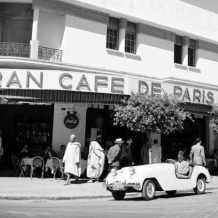
Nass El Ghiwane appeared on the scene in the late 1960’s in Morocco. Whenever mentioned in the Western literature, they are referred to as The Rolling Stones , as American Producer Martin Scorsese once put it. They have been the most politicized of all the chaabbi-fusion groups and placed great emphasis on their lyrics, which are renowned throughout Morocco and North Africa.

History
Nass El Ghiwane are living legends who merged the rich repertoire of traditional Moroccan music with lyrics that sited political and social injustices. The group was formed by four young men from the poor district of Hay el Mohammadi in industrial Casablanca. Laarbi Batma (who came from the Chaouia region to Kariane Jdid) met Boujemaa Hagour (who came from the Tata (Morocco) region to Derb Moulay Cherif) through their mutual friend Omar Essayed.

While performing the piece “Al Majdoub” in the theater troupe, Tayeb Essidiki, for Parisian crowds in the summer of 1969, they had the idea of using traditional music as a way to express themselves onstage. Hence Nass El Ghiwane was born. In a time where the only music available was middle-eastern pop music that sang about love, Nass el Ghiwane had prepared something new for Morocco: they mixed the Sufi chants and litanies of Zaouias (brotherhoods) like the Hmadcha and Aissawa with the elegant colloquial poetry of Melhoun adding to it the ancient rhythms of the Berbers and the healing dances of the mystical Gnaouas. Morocco just receiving its independence from the French and its population, still uncertain of what the future was hiding, was shocked and moved by the texts of Nass el Ghiwane: corruption, injustice and degradation of society. They were the first Moroccan band to mix such a diverse and rich heritage and to speak their minds even about the most forbidden subjects.






